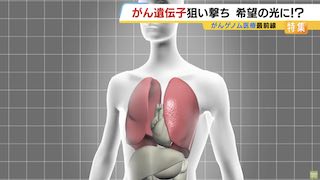TOKYO, Oct 31 (News On Japan) –
Diagnosed with lung most cancers in his forties and given a prognosis of simply six months to stay, a person has defied the percentages and remains to be working full-time, eight years after the preliminary analysis. This was made doable by the newest therapy methodology often called “cancer genome medicine.”
Hisa Aoshima, 52, a resident of Yatsu City in Shizuoka Prefecture, has been residing with none therapy for his lung most cancers, discovering enjoyment in his every day life. He first found the sickness in September 2016 when a shadow was detected on his proper lung throughout a well being verify.
“I don’t smoke, so why did I get lung cancer?” Aoshima shared, recalling the shock of the analysis. Following the invention of his sickness, Aoshima shortly underwent surgical procedure to take away a 3.8 cm tumor, which was bigger than anticipated and had unfold to his lymph nodes, indicating superior illness. A 3rd of his proper lung was eliminated, and he additionally underwent chemotherapy. However, the most cancers later unfold to his left lung, resulting in a Stage 4 analysis. He was then advised he had solely six months left if the following therapy didn’t work.
“I couldn’t sleep after that,” Aoshima admitted. “I worried that if I fell asleep, I might not wake up in the morning, or maybe I’d die in my sleep.”
At the time, he was 46 and residing along with his spouse and two kids—a son in his second yr of highschool and a daughter within the sixth grade. He remembers, “I was devastated, thinking I was going to die soon. I often cried in the hospital room, feeling lost.”
Determined to seek out one other therapy possibility, Aoshima joined a help group for lung most cancers sufferers, the place members brazenly mentioned their remedies and well being circumstances. “Listening to their stories made me realize how little I knew about my own illness. All I really knew was that I had lung cancer and had surgery for it,” he mirrored, prompting him to begin studying extra about lung most cancers.
Through help group conferences and analysis, Aoshima discovered hope in “genome medicine,” a therapy tailor-made to every affected person’s particular gene mutation. In genome drugs, most cancers is handled primarily based on genetic mutations that adjust between people. If an appropriate drug is discovered for a selected mutation, the therapy can have a big impression.
One of probably the most notable advances in lung most cancers therapy over the previous twenty years has been the event of molecularly focused medicine, which at the moment are obtainable for practically half of lung most cancers sufferers who bear genetic testing.
About eight years in the past, Aoshima requested his physician to check him for vital mutations, however none have been discovered. However, by way of his involvement with the affected person neighborhood, he discovered about different doable mutations. Upon re-testing, a uncommon mutation within the “ROS1” gene was discovered, a mutation current in solely about 1% of lung most cancers instances. Fortunately, a focused remedy had already been developed for it.
“When they told me, it felt like grabbing onto a lifeline,” Aoshima mentioned with emotion. “I cried with a sense of relief, feeling that my life could continue.”
Aoshima started therapy with the focused drug in 2020. Although he skilled excessive fevers and rashes as unintended effects, his spirits have been lifted by a home made calendar despatched by his household, which he checked out every morning to really feel related with them regardless of not with the ability to see them within the hospital.
After a yr of therapy, Aoshima’s tumor had shrunk to the purpose the place it was practically undetectable on CT scans. While he has skilled well being points since, he has returned to full-time work and hasn’t obtained any therapy for over a yr.
Recently, Aoshima visited the hospital along with his spouse for a semiannual check-up. As they waited for the outcomes, his spouse expressed the acquainted anxiousness of every go to.
“Everything is stable,” the physician assured them. “There’s no sign of progression, and for now, there’s no need to resume treatment.”
“I don’t expect the cancer to disappear completely,” Aoshima admitted. “But as long as I can live with it, I’ll keep holding out hope for new treatment options.”
Source: MBS


